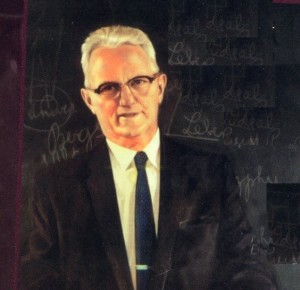I recently discovered that the German mathematician, astronomer and astrologer Johannes Kepler used the phrase “thinking God’s thoughts after Him.” Referring to his work in astronomy, Kepler said: “I was merely thinking God’s thoughts after Him. Since we astronomers are priests of the highest God in regard to the book of nature, it benefits us to be thoughtful, not of the glory of our minds, but rather, above all else, of the glory of God.”
This idea can become rather Stoic at times. It has that sense in Twenty-Four Hours a Day, a book of recovery meditations for members of Alcoholics Anonymous. The December 18th meditation said that the nearer astronomers get to the ultimate composition of all things, the nearer the universe approaches a mathematical formula, which is thought. The universe itself may be the thought of the Great Thinker. Therefore, “We must try to think God’s thoughts after Him.” We must try to get guidance from the Divine Mind as to what His intention is for the world “and what part we can have in carrying out that intention.”
 Since my time in seminary, I have been deeply influenced by the writings of Cornelius Van Til and his very different sense of thinking God’s thoughts after Him. Van Til said that as creatures of God, we are analogues of God. “God is the original while man is the derivative. Man’s thoughts must therefore be patterned after God’s thoughts. Man must, as we often express it, think God’s thoughts after Him.” (Essays on Christian Education)
Since my time in seminary, I have been deeply influenced by the writings of Cornelius Van Til and his very different sense of thinking God’s thoughts after Him. Van Til said that as creatures of God, we are analogues of God. “God is the original while man is the derivative. Man’s thoughts must therefore be patterned after God’s thoughts. Man must, as we often express it, think God’s thoughts after Him.” (Essays on Christian Education)
Christianity presupposes the self-sufficient God of Scripture. God created the universe for and unto himself. “By his providence, God sustains the universe in order to realize his ultimate purpose with it.” There is purpose in the universe because God has made it so. And every purpose in the universe must be referred to God. “Without this reference to God, no purpose within the universe has meaning.” (Christian-Theistic Evidences)
If man is not autonomous, if he is in fact what Scripture says he is—a creature of God and a sinner—then he should “subordinate his reason to the Scriptures” and seek its light to interpret his experience. God’s revelation in nature as well as Scripture is always authoritarian. “The truly scientific method, the method which alone can expect to make true progress in learning, is therefore such a method as seeks simply to think God’s thoughts after him.” (The Defense of the Faith)
If theism is true, only that thought and interpretation on the part of man is true which recognizes God as the source of man and man’s interpretation. Hence we hold that in the nature of the case there is not only one true religion, but only one true interpretation of all science as well. We hold that all science that does not recognize God as the maker of the facts with which it deals and the mind with which it thinks as created by God and as properly thinking God’s thoughts after him, is false science. (Psychology of Religion)
The modern, understanding of science asks us to grant the theoretical relevancy of any hypothesis. It also asks that we test the truth of any hypothesis by experience. Lastly, the modern scientific method assumes the reality of neutral, brute, facts. But if God exists, there are no brute facts. Our study of facts must seek to know them as God wants them to be known by us. “We must then seek to think God’s thoughts after Him. To assume that there are brute facts is therefore to assume that God does not exist.” The autonomous human mind thinks of itself as acting completely independent of God. (Unpublished Manuscripts of Cornelius Van Til, Electronic edition)
So in this blog and in the other material on this website, I seek to “Think God’s Thoughts” in the sense meant by Van Til.





